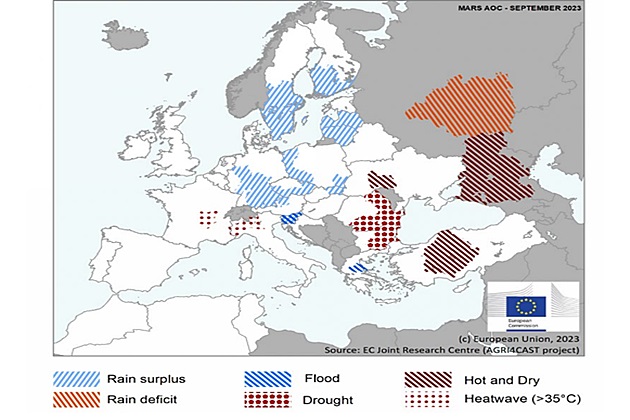745

Following the generally adverse developments of spring weather, despite the rains in recent days, summer 2024 will be characterized by warmer conditions than usual in most parts of the EU, heatwaves occurring in many places, which have had a negative impact on summer crops.
In particular, more distinct positive temperature anomalies (up to 4 degrees above average) were observed in parts of the Iberian Peninsula, southern France, the Alps, and locally in the Balkan Peninsula, according to the latest forecast published by the European Commission DGAgri.
As a result, dry conditions worsened and compromised yield formation potential, especially in Romania and Bulgaria. On the other hand, wetter than usual conditions were observed in other regions. In northern Italy, southern Austria, Slovenia, and Croatia, these occurred in the form of torrential rains, followed by heatwaves.
Further floods occurred in Slovenia, while unprecedented floods were reported in Switzerland. Precipitation surplus was continuously reported in the last weeks of the observation period in Central Europe (causing delays in rapeseed harvesting and sowing) and Scandinavia, resulting in wet soil conditions there.
While crops were negatively affected, this helped pastures recover from previous precipitation deficits. On the other hand, regions with warm and dry conditions saw a decrease in pasture productivity.
In addition to reduced yield expectations in various sectors due to unfavorable weather conditions (e.g., cereals, grapes, olives for oil, fruits), there are also reports of lower quality of harvested products.
Extremely wet conditions (persistent or due to heatwaves following heavy rains) increased the occurrence of pests and diseases. For example, wet conditions triggered fungal diseases due to delayed cereal harvesting. As a result, some crops may have lost their quality for food use. Additionally, they may have lower protein content. Therefore, if not used for food and if certain quality requirements are confirmed, they could still be partially used for fodder instead in 2023/24.
The anticipated lower quality of oranges is likely to lead more products to be channeled back to processing (about 5% above the previous marketing year). On the other hand, sugar beet productions are expected to be higher (1.4% above the previous marketing year), with sugar content likely to improve.
As can be seen on the map published by DGAgri, Romania will be hit by severe drought in this agricultural year.




